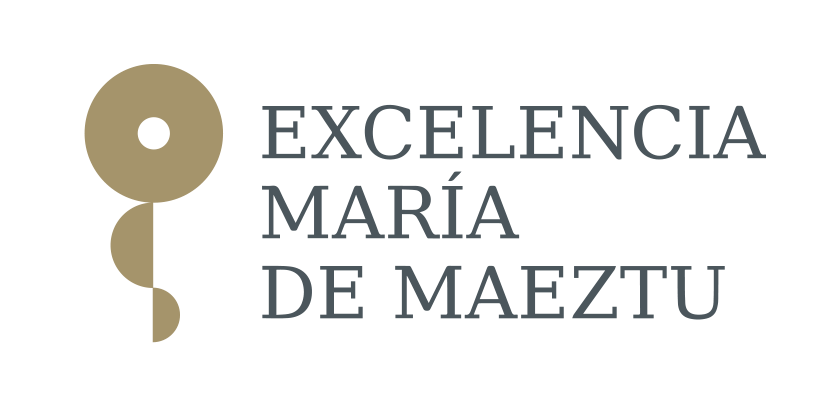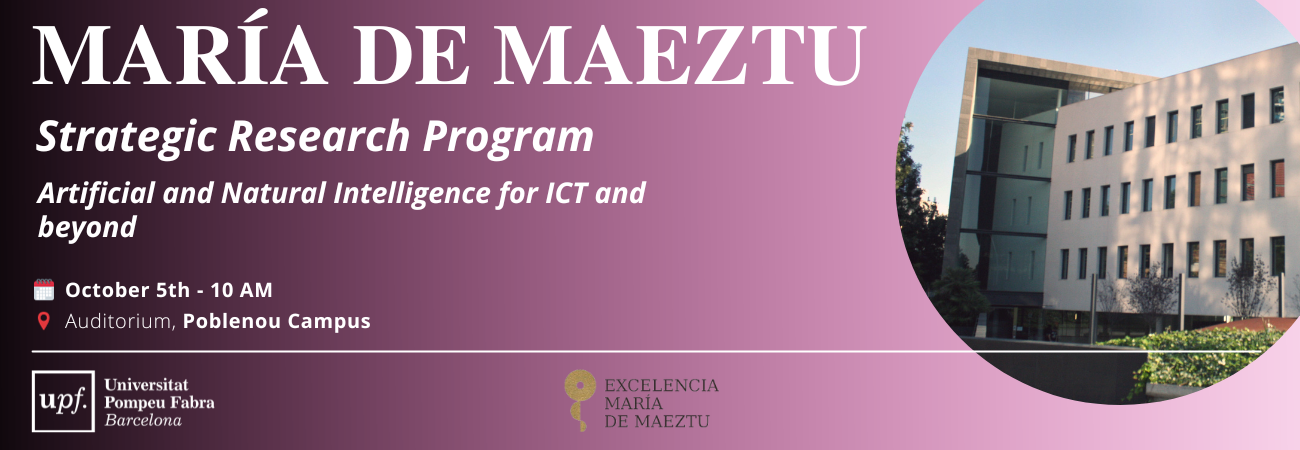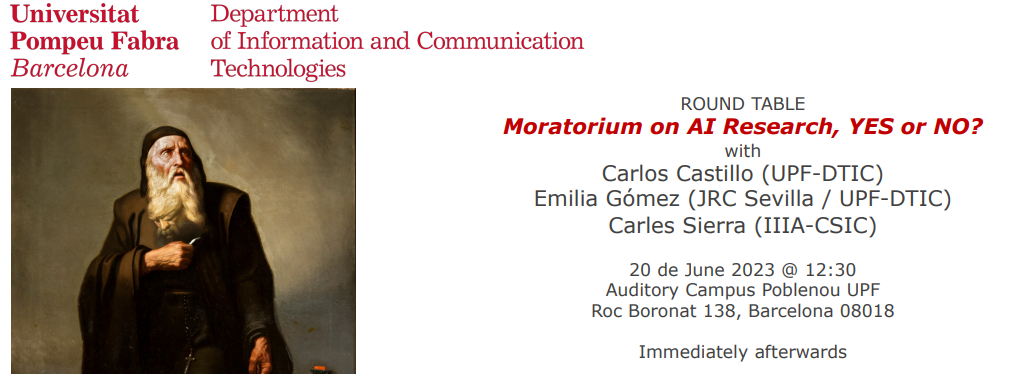The second Maria de Maeztu Strategic Research Program (CEX2021-001195-M) of the Department of Information and Communication Technologies (DTIC) takes place between 2023 and 2026. The website for this program is under construction. You can find some details in this news.
The first María de Maeztu Strategic Research Program (MDM-2015-0502) took place between January 2016 and June 2020. It was focused on data-driven knowledge extraction, boosting synergistic research initiatives across our different research areas.
Protein degradation and its applications in cancer, the focus of the lecture by the Nobel Prize for Chemistry Aaron Ciechanover
Protein degradation and its applications in cancer, the focus of the lecture by the Nobel Prize for Chemistry Aaron Ciechanover
On 1 April, Pompeu Fabra University, in collaboration with Novartis, invited the researcher Aaron Ciechanover to give a talk about the ubiquitina-proteasome system.
Within the framework of activities to celebrate its 25th anniversary and with the support of the company Novartis, on Friday 1 April Pompeu Fabra University invited the researcher Aaron Ciechanover to give a talk in the auditorium of the Barcelona Biomedical Research Park (PRBB). Ángel Lozano, vice-rector for research at the University, got the proceedings underway expressing the honour involved in receiving a Nobel Prize-winner at our University. The Novartis director of institutional relations, Concha Marzo, participated in the opening speeches and recalled the support that the company gives to both research and the university.
David Comas, director of the DCEXS, and Joaquim Gea, dean of the Faculty of Health and Life Sciences, closed the introduction by taking stock of the positive results that the Department is obtaining in research and summarizing the curriculum of the guest speaker.
With the title “The Ubiquitin Proteolytic System: From Basic Mechanisms through Human Diseases and on to Drug Targeting”, the winner of the Nobel Prize for Chemistry (2004), Aaron Ciechanover, briefly summarized his extensive knowledge of the ubiquitin-proteasome system, a cell complex responsible for removing residual proteins.
Researching the unknown
Every day, between the 6-8% of all proteins in our body is removed, which means that in a couple of months, all our proteins will have been renewed. "Today I'm not made of the same materials as I was a month ago. However, my appearance, my memory, my knowledge ... they all remain the same. We are, therefore, a kind of complex computer where the hardware changes every day, but the software is stable". This is how Aaron Ciechanover introduced the impact that protein degradation has at macroscopic level, although his studies focus on the molecular field.
In the late 1970s and early ‘80s, scientists knew the process by which cells synthesize proteins. However, the mechanisms by which residual proteins are removed from the cells specifically remained unknown. In 1976, Ciechanover joined Avram Hershko’s research group at the Faculty of Medicine of the Israel Institute of Technology (Technion) to undertake a doctorate, which would focus on the search for the molecular system that allows the degradation of proteins in cells.
In 1978, Ciechanover authored what he considers the most important article he has ever published in his career, in which he described a system of protein degradation of reticulocytes (immature red blood cells). This article appeared in the journal Biochemical and Biophysical Research Communications, which at that time was not a high impact publication. Regarding this, the researcher coined the phrase "it doesn’t matter where you publish, but what you publish". As his career progressed, the researcher was getting deeper into his great discovery: the ubiquitin-proteasome system present in cells, necessary to carry out a selective and specific elimination of cellular proteins.
A discovery with several medical applications
The ubiquitin-proteasome system works simply: residual proteins are labelled several times with a small molecule called ubiquitin. This labelling makes the proteins recognizable by a molecular complex that will drive them to the proteasome, which will be broken down into simpler parts that will be reused by the cell.
The removal of residual protein is essential for cells: defects in the ubiquitin-proteasome system are closely linked to serious illnesses. Almost all neurodegenerative diseases are characterized by the accumulation of proteins: Parkinson, Alzheimer... Also in cancer, ubiquitinization plays such an important role, as malignant cells can originate following two patterns: either the degradation of tumour suppressor proteins is increased, reducing the presence of these antitumour defences, or the removal of oncogenic proteins is reduced, causing an increase in the cell’s oncogenic factors.
Gaining this knowledge has helped in the design of new anticancer drugs. Two such drugs which are providing better results are the commercially named Velcade (bortezomib), used in patients with multiple myeloma and non-Hodgkin's lymphoma, and nutlin-3, with very similar results to chemotherapy but without suffering the side effects that it entails.
To conclude the conference, Ciechanover addressed the new uses that thalidomide is acquiring. This drug emerged in the 1960s to relieve nausea in pregnant women. Unfortunately, years later it was discovered that this compound could adopt two different isomers despite having the same molecular formula forms, and one of the isomers caused malformations in foetuses. Today, thalidomide is showing very good results in the treatment of cancer, since it acts as a ”molecular glue": it allows residual proteins to join the molecular complex that will transfer them to the proteasome. It is a drug with enormous potential. “None of these drugs constitute a cure for cancer. However, they contribute between 10 and 15 years of good quality life for patients, something that until now seemed unthinkable."
Aaron Ciechanover was born in 1947 in Haifa. He is a medical doctor by the Hadassah Medical School of the Hebrew University of Jerusalem. In 1976 he joined Avram Hershko’s lab at the Technion Faculty of Medicine, where he received his doctorate in science in 1981. He conducted his graduate studies at Massachusetts Institute of Technology (MIT). Three years later, in 1984, he returned to Israel to join the Faculty of Medicine at the Technion, where he continued his research with many students, scholars and doctors, and where he is currently Professor of Research at the Vascular and Cancer Biology Research Center at the Rappaport Faculty of Medicine and Research Institute. In year 2000 he received the Albert Lasker Award for Basic Medical Research and in 2003 the Israel Prize for Biological Research. In 2004, together with Avram Hershko and Irwin Rose, he received the Nobel Prize for Chemistry for his discovery of the system ubiquitin-proteasome.
Related Assets
Department of Information and Communication Technologies, UPF
Grant CEX2021-001195-M funded by MCIN/AEI /10.13039/501100011033


Department of Information and Communication Technologies, UPF
- Àngel Lozano - Scientific director
- Aurelio Ruiz - Program management




